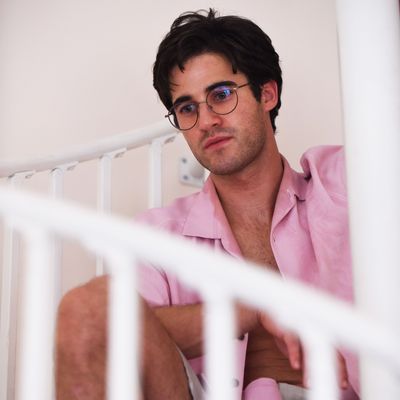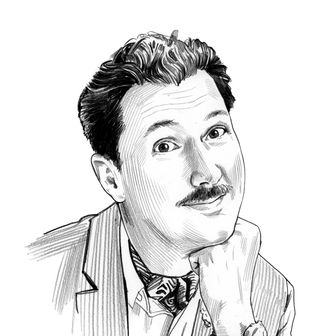
One of the things I remember most vividly about the hunt for Andrew Cunanan was watching his final showdown on television. The regular broadcast was interrupted as the police went into a houseboat and found his dead body, and I just remember someone on TV saying “houseboat,” “houseboat,” “houseboat” repeatedly. That is the one detail about this story that always stuck out to me.
I’ve always wanted to live on a houseboat, ever since MacGyver had one. But being from the landlocked part of Connecticut, it was never a reality. That’s probably why I imagined the houseboat where Andrew killed himself as being more like a sailboat, like the one where he hid before he got caught by that sunburned lady looking for her friend Antonio. It seemed cramped and gross in my mind. Of course, that wasn’t the reality at all: He was in some old queen’s fantasy world of a house boat and it was like the ‘70s come to life, complete with wicker furniture and a nearly campy interior. It had a giant television projector — cutting-edge technology at the time — and, if American Crime Story is to be believed, a closetful of nice clothes that miraculously fit Andrew. This all made me totally rewrite the narrative of how I had imagined Andrew’s final hours.
Still, this finale limps toward the finish line. Maybe that’s because I was one of the viewers who watched the police close in on Andrew back in 1997, so I already knew how this story ends. But looking back, I feel like the most interesting parts of this series were front-loaded into the first few episodes. Even those of us who followed the story knew little about Cunanan’s earlier crimes or his motivations, so shining light on those aspects of his life was an interesting choice — not just because of this story, but because of the time in general.
Now that we’re focused on Andrew’s final head-shaving, dog-food-eating days in a houseboat, there isn’t much more exposing left to do, save for a few heartbreaking moments with his parents. I’ll never forget that image of his mother Mary Ann, smoking a cigarette with a blanket over her head and illuminated only by the television. What happens with his father Modesto is also heartbreaking: When Andrew reaches out to him, he tells Andrew that he’ll come back to the U.S., even though there are charges against him, and he will take him back to the Philippines and get him to freedom and safety. Andrew waits by the door with his clothes packed and calmly reading. (How do you select a book when you’re on the run and it might be the last one you ever read?) Modesto never shows up, but Andrew does see him on television talking about how he’s selling the rights to his son’s story and exploiting their phone call for his own gain. For the final time, his father has failed him.
Perhaps my favorite moment in the finale is Andrew watching Marilyn Miglin hawking her perfume on television. “I imagine going back in time and telling [my mother], Here is something I made for you, the kind of perfume my father would give you for your birthday as a way of saying how special you are,” she says, as if speaking directly to him. Here she is, creating the same kind of narrative of rewriting reality, of rewiring the past to make the future electric, that Andrew mastered. She is using it to make the fortune that Andrew craved, while all he could do with his gifts was destroy. We would hope to see some empathy in Andrew for what he did to Marilyn’s husband, but we never see that. Instead, we see something close to awe.
I’m not sure if Andrew actually watched all of that coverage of the manhunt, but it sure makes sense that he would in this show, given what we know about his character. It also makes sense that he would go from laughing about it (as the cork on his Champagne pops) to absolutely loathing it (as the media coverage paints him to be something that he didn’t think he was).
What’s odd is that, no matter how much of a monster Andrew was, the coverage and the hunt were so much worse than we could imagine. After all, hasn’t that been the point of this show all along? The worst offender is the wanted poster with Andrew’s face, which also shows mock-ups of what he might look like dressed as a woman. (Not that it matters, but it looks like VHS cover art for a bad made-for-television movie starring Marilu Henner as a police officer searching for a serial killer in a drag bar.) Even though he never had a penchant for drag, the FBI just automatically assumed that a gay man would either disguise himself as a woman or actually want to live life as a woman. This idea that the police’s homophobia made them ineffective at catching Cunanan was lightly considered in the opening episode and I hoped it would be picked up more subsequently, but it seems to have lost steam just as the series did. Save for this one moment, it’s a shame it wasn’t a bigger focus.
The Versace side of the drama is a little lackluster, too. I felt especially bad for Gianni’s boyfriend Antonio, who was shut out by the family, ignored by the priest at the funeral, and generally mistreated by everyone because he couldn’t (or didn’t) legally marry. But what happens between him and Donatella — her shutting him out of the homes and his promised allowance — seems less about him being gay and more about Donatella not liking him, so it’s a different narrative that doesn’t necessarily explore the homophobia of the time.
Meanwhile, it feels like “Alone” brings all of the guest stars out of hiding so they can each get one little turn onscreen again. We not only see Marilyn, Antonio, and Donatella, but also Andrew’s junkie friend Ronnie and all of the prominent detectives from the case. (You know, the detectives who seemed like they’d have a more active role after the first episode.) After Andrew kills himself, we’re left to wade through all of the drama with the rest of the players. The worst of it, without a doubt, is Antonio trying to kill himself out of grief. Although the real Antonio did admit to depression following Versace’s death, he is still alive and well. Leaving the audience with him collapsing in a maid’s arms seems deceptive at best and a bald-faced lie at worst.
The scene that really wrapped up the whole drama — for me, at least — was Andrew remembering his meeting with Versace. We find out that they never had sex, and that Gianni was the one man who didn’t fall into Andrew’s advances because he knew it would cheapen his dreams and ambitions. When Andrew tells Versace all about his desire to be special and how he’ll convince the world of it, his reply is, “It’s not about persuading people you’re going to do something great. It’s about doing it.” That one line separates what makes these two men different.
Whether or not we like it, though, they are inextricably linked because Andrew will forever be piggybacking off of Versace’s greatness. In the final images of the season, Donatella mourns over Gianni in his own mausoleum while we see Andrew’s tiny placard amongst a million similar ones in a public resting place with no one there to remember him. The show’s closing statement seems to be that Versace is ultimately greater, a true individual who was loved and whose accomplishments will withstand the test of time, while Andrew is just some nobody who tried to find greatness with destruction. However, this message seems at odds not only with reality, but with the case that the show itself made by trying to find the humanity in Andrew.


